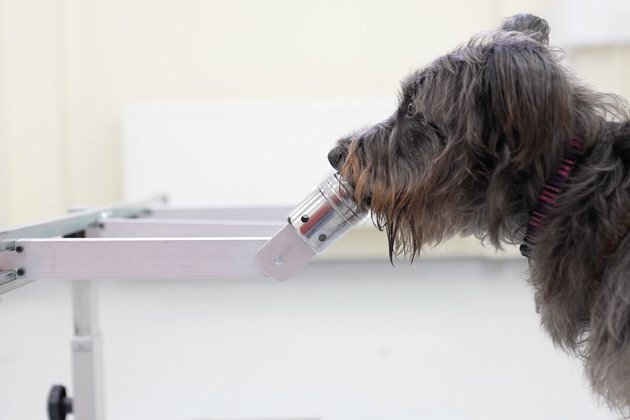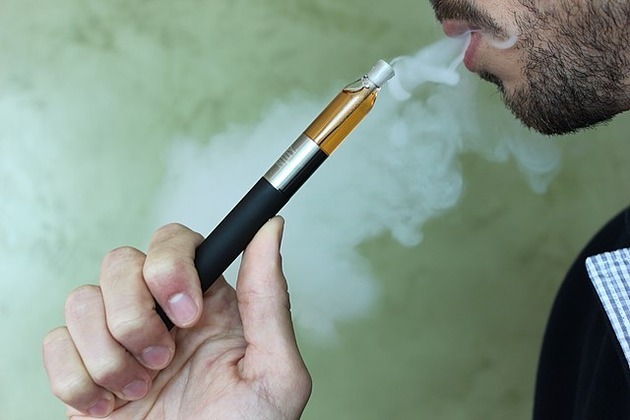Dogs can smell people's stress - new study
The Conversation
29 Sep 2022, 00:10 GMT+10

Dogs have a long history alongside humans, giving them an amazing ability to read human cues. Dogs also possess an incredible sense of smell, which enables them to detect diseases, such as COVID and lung cancer, in humans from odour alone. Whether dogs' capabilities extend to detecting odours associated with psychological states has been explored far less.
When people are stressed, there are hormonal and nervous system changes that alter the kinds of odours produced by the body. My colleagues and I wanted to know if dogs can discriminate between odour samples taken from the same person before and after becoming stressed. To do this, we took ideas from the field of biomedical detection dogs (sniffer dogs in a laboratory setting) and combined these ideas with techniques used to test dogs' perceptions of odours.
Our results are published in the journal PLOS One.
To test whether dogs could detect an odour associated with psychological stress, we attached sensors to the study participants to continuously measure their heart rate and blood pressure. Participants also rated how stressed they were feeling before and after taking part in the task.
Before the task started, participants wiped gauze on the back of their neck, placed it into a sterile glass vial, and exhaled into the vial. We then got the participants to perform a rapid mental arithmetic task to induce stress in them.
After the task, participants provided another rating of their stress and two additional sweat/breath samples.
The total time between the collection of the relaxed (pre-task) and stressed (post-task) samples was four minutes, reducing the likelihood that the participants experienced changes other than the onset of stress.
We only included samples in the study if the person reported finding the task stressful, and both their heart rate and blood pressure had increased during the task. We presented samples from 36 people to the dogs.
The training process
The dogs included in this study were pets, volunteered by their owners, who were trained using positive reinforcement by researchers in a laboratory once a week. Before formal data collection began, dogs were taught to communicate that they were picking a sample by standing and freezing above it for several seconds or sitting in front of it - we called this their "alert behaviour".
The dogs were then taught a matching game, where they learned to discriminate between samples with known odour differences. Once it was established that the dogs were successful at this, they were ready to be tested.
At testing, we tasked the dogs with discriminating between a person's samples taken before and after the arithmetic task. To teach the dogs what odour they should be looking for in each testing session, they were first shown the person's stress sweat/breath sample alongside two "control samples" - clean gauze in glass vials with no sweat or breath.
The dogs were allowed to sniff all three samples and were rewarded for alerting the researchers to the sweat/breath sample.
After ten exposures, a second breath/sweat sample was added to the line-up: the same person's relaxed sample. Here began the test of discrimination, which took place over the next 20 trials. It was the dogs' job to communicate, through their alert behaviour, which sample they perceived as the same as the one shown to them in the previous ten trials, that is, which sample smelled like the stress sample. Because dogs might use other information to help them make a choice, we included both visual and odour controls.
If these two odours smell the same to the dog, we would expect them to pick either by chance. If the two odours smell different, they would be able to consistently find the odour first presented to them: the stress odour. Each sample set from participants was used only once, so the dogs saw samples from a different person during each session.
From the very first time the dogs were exposed to these samples, they perceived the samples as smelling different. The dogs correctly chose the stress sample in 94% of 720 trials, showing that the participants' psychological experience of the arithmetic task had resulted in their body emitting odours in their breath and sweat that the dogs could detect.
It should be noted that this study does not determine whether the dogs perceived the stress samples as reflecting a negative emotional state. It is likely that in a real-life setting dogs use a variety of contextual cues, such as our body language, tone of voice, or breathing rate, to help them understand a situation. However, the results provide firm evidence that odour is also a component that dogs can pick up on.
Establishing that dogs can detect an odour associated with human stress provides deeper knowledge of the human-dog relationship and adds to our understanding of how dogs perceive and interact with human psychological states. This knowledge could also be useful for the training of anxiety and PTSD service dogs that are currently trained to respond predominantly to visual cues.
Author: Clara Wilson - PhD Candidate, Psychology, Queen's University Belfast 
 Share
Share
 Tweet
Tweet
 Share
Share
 Flip
Flip
 Email
Email
Watch latest videos
Subscribe and Follow
Get a daily dose of Northern Ireland News news through our daily email, its complimentary and keeps you fully up to date with world and business news as well.
News RELEASES
Publish news of your business, community or sports group, personnel appointments, major event and more by submitting a news release to Northern Ireland News.
More InformationBusiness
SectionMeta joins tech shift to nuclear power for AI and data centers
MENLO PARK, California: As artificial intelligence demands explode, Big Tech is turning to an old source for new power: nuclear energy....
Strong economic data drives U.S. stocks higher
NEW YORK, New York - U.S. stocks rose appreciably Friday following the release of a strong jobs report which sent the U.S. dollar higher,...
US Job openings rise, but layoffs and tariff fears cloud outlook
WASHINGTON, D.C. America's job market is starting to lose momentum. In April, job openings rose — but so did layoffs, marking their...
Ireland sees 11% drop in social media sector jobs
DUBLIN, Ireland: Digital Business Ireland (DBI) has asked the Government to do more to help Ireland's digital and tech sector. This...
Akio Toyoda’s real estate firm to buy Toyota industries
TOKYO, Japan: Toyota has announced that it will take one of its key group suppliers, Toyota Industries, private in a deal worth UD$26...
U.S. stock markets slip after Tesla dives more than 14 percent
NEW YORK, New York - U.S. stocks fell Thursday after the feud between U.S. President Donald Trump and his biggest backer Elon Musk...
International
SectionSecurity forces clash with insurgents in North Waziristan
ISLAMABAD, Pakistan: Pakistan's army said on June 4 that its security forces raided a militant hideout and killed 14 insurgents during...
Latvia, Liberia, Colombia win seats on UN Security Council
NEW YORK CITY, New York: The United Nations General Assembly has elected five countries to join the Security Council starting January...
Lee Jae-myung becomes president after South Korea’s political crisis
SEOUL, South Korea: South Korea's new president, liberal Lee Jae-myung, took office on June 4 after a dramatic and chaotic few months....
Britain outlaws single-use vapes over health and litter fears
LONDON, UK: As of this month, it's officially illegal to buy disposable vapes anywhere in the United Kingdom. The new ban, aimed...
Policy debates in South Korean election drowned by personal attacks
SEOUL, South Korea: South Korea's upcoming presidential election has turned into a messy battle full of personal insults and scandals...
Over 25,000 flee as smoke from fires worsens air quality in Canada, US
FLIN FLON, Manitoba: More than 25,000 people in three Canadian provinces have been forced to leave their homes because of wildfires,...













